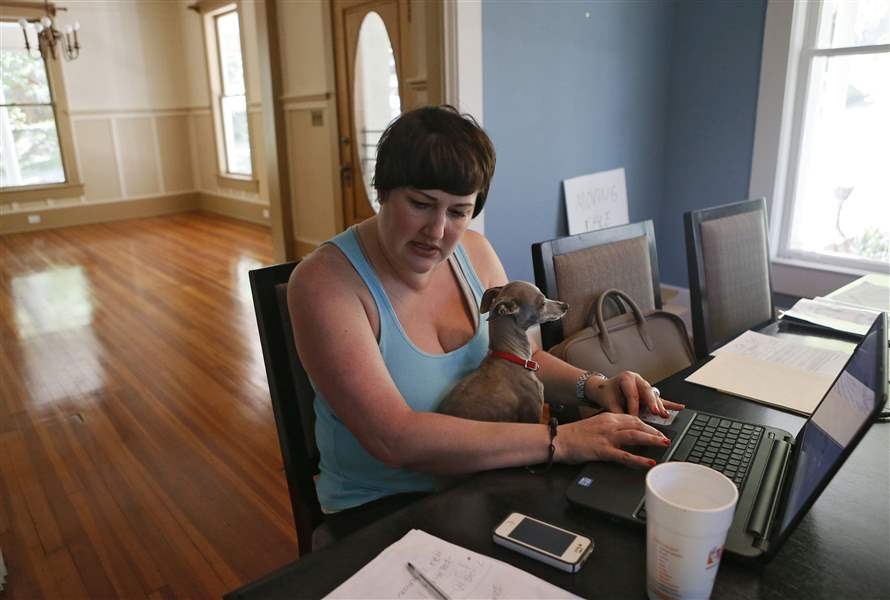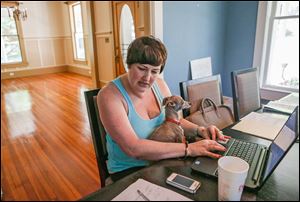
Part-time workers’ ranks fall, but slowly; 7.4M unable to find full-time positions
6/15/2014
Velvet Bradley works part-time at the dining room table in her home, with her Italian Greyhound, "Sterling," in her lap, while editing a magazine, April 22, 2014, in Rockmart, Ga. The living room behind her is empty because her house has been foreclosed on and she is in the process of moving out. (Bob Andres/Atlanta Journal-Constitution/MCT)
MCT

Velvet Bradley works part-time at the dining room table in her home, with her Italian greyhound, Sterling, in her lap, while editing a magazine in Rockmart, Ga. The living room behind her is empty because her house has been foreclosed on and she is in the process of moving out.
ATLANTA — For Velvet Bradley, a part-time job is a little like a tattered parachute — a hopeful notion that barely slows the fall.
Ms. Bradley, 43, works 10 to 25 hours a week at home, helping to run a small trade magazine. She sells ads and manages the database and Web site, but the pay is modest and the hours few — and she has been stymied trying to find full-time work since losing a managerial job.
In the past few months, she lost her car to bankruptcy and her home to foreclosure.
“I’m just trying to keep the utilities on and the Internet going,” said Ms. Bradley, who lives in Rockmart, Ga., 45 miles northwest of Atlanta. “It’s been two years of this and I have just had it.”
About 26.3 million Americans work part-time, according to the Bureau of Labor Statistics. Some want flexibility or are in school. Some are satisfied padding a partner’s income.
But nearly 4 in 10 part-timers — 7.4 million — have taken part-time work only because they cannot find a full-time job, the BLS estimates, based on surveys it uses to measure unemployment.
The number of those involuntary part-timers rocketed to record levels as the recession deepened in 2008 and it slowly declined as growth restarted. The economy has slowly improved for nearly five years, renewing job growth and bringing down the jobless rate.
The number of part-timers who’d rather be full-time remains historically high, however: 4.7 percent of all jobs nationwide. That’s down from the 2010 peak of 6 percent, but higher than other times since the early 1990s recession.
“We are creating a lot of part-time jobs in this recovery,” said economist Jeff Wenger of the University of Georgia. “Part of it is this business cycle being so weak. And some of it is driven by changes in business practices.”
Federal Reserve economists recently reported that many service-sector companies are leaning more heavily on part-timers than during previous recoveries.
The result is a lopsided labor market in which many candidates jostle around nearly every opening — and companies can use part-time positions as a stopgap, knowing workers have little choice.
Whitney Cook, 29, of Ball Ground, Ga., left her job as a dispatcher in Alpharetta, Ga., last summer when she was told city policy prohibits both her and her firefighter husband being on the city payroll.
“I have been trying to find something full-time and I am looking for anything that I’m qualified for — clerical, administrative, dispatching,” she said. “It has been a struggle. Looking for a full-time job — that is my full-time job.”
Ms. Cook is one semester shy of a degree in criminal justice. “There are a lot of jobs I think I’d be qualified for if I just had that piece of paper. It is frustrating.”
Several months ago, Ms. Cook took a job as an overnight, part-time dispatcher for a towing company, averaging 20 hours a weekend.
There’s been speculation and debate about whether the Affordable Care Act, which requires companies to offer health insurance once they reach a certain number of full-timers, has prodded employers to make more jobs part-time. But the number of part-timers, while still historically high, has continued to dwindle as the ACA takes effect.
The ACA could also boost part-time work as a voluntary choice by making health insurance more available to people who don’t want or need a full-time job.
Whatever the ACA’s effect, companies go with part-timers for a number of other reasons. Hiring permanent workers can be costly — in screening, training, and providing benefits. It is also a gamble: what if sales slow? Firms sometimes use part-timers as a stopgap until they are sure things are getting better.
And with so many job-seekers, companies figure a part-timer won’t likely be hired away for a full-time job that pays better. Part-time jobs can also be a “tryout” — a chance for companies to see someone’s work on the cheap, in case the company does want to hire full-time.
On the other hand, full-time workers can offer stability and better productivity. So companies generally shift from part-timers to permanent workers as the economy improves.
Only this time, not so much.
More than one-third of companies questioned in a recent survey said they are hiring a combination of part-time and permanent employees, and an additional 7 percent say they are only adding part-timers, said Scott Smith, CEO of the Lucas Group, the Atlanta-based, executive search firm that polled executives.
Yet the trajectory is positive: No companies said they are in layoff mode, he said. “You are starting to see more and more people hiring.”
But so many successful companies are cautious about hiring that even experienced executives can have trouble finding full-time slots.
Todd Darby, 51, of Milton, Ga., works part-time selling recycling equipment, parts, and services. He’s been looking for full-time work since he and his previous employer agreed to “a mutual parting” 14 months ago.
“I am under-employed,” he said. “I didn’t dream it would take this long to find something.”
Mr. Darby said he has used much of his savings. “I can’t do this indefinitely. I am at the precipice.”
In a normal recovery, the part-time trap would have dissolved by now. This time, employers may see part-timers as a long-term strategy, said economist Barry Hirsch of Georgia State University’s Young School of Policy Studies.
“In a strong labor market, employers usually can’t get away with this. But it also seems that the norms have changed a bit — about how employers treat employees,” he said.